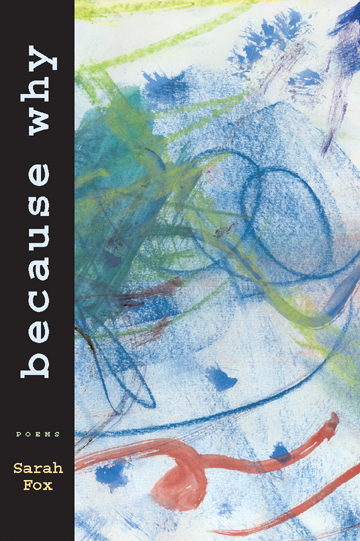Thinking Souls: Book Review: Because Why
Shannon Gibney reviews Sarah Fox's book "Because Why" for Thinking Souls. It's beautiful and strange.


It’s hard not to be drawn into a book whose poems begin “Hours after eating / centuries / we’ve failed to disrobe / the meatloaf and onions / from our backs.” Sarah Fox’s “Act I,” in the middle of her collection Because Why (Coffee House, 2006), finishes just as ceremoniously as it began:
“But now
we’ve lost track in the restaurant:
the meatloaf,
the meal we share
like a pair of apostles
pleased with their shoes
but not their heaven
nor many of their habits,
a television show they’ve missed
as a result of this outing,
nor, generally, the music
on the restaurant’s jukebox,
and the fact that they will continue to awaken,
shine their faces and drive their cars,
greet their scrappy teeth.
And we don’t know
the people who feed us!”
In equal measures absurd, existential, and just plain exhilarating, Because Why eloquently expresses the strange times in which we live, without resorting to the erudite, self-conscious tricks that have come to be the hallmark of so much postmodern poetry. Reading through the slim volume leisurely, over the course of a week, I found myself laughing out loud in sections, and silently contemplating everyday truths in others. Simply put, this collection is the best one I’ve read in at least five years.
Because Why’s delights derive from the many techniques that Fox uses to explore the surreal world of the mind and the attendant “real” world that the mind perceives. The title poem, for instance, dedicated to poet Lorine Niedecker, employs broken syntax to reveal the simultaneous inability of language to describe something as indescribable as a tree, and also the beauty that is evoked when we try to do so: “…The Woods. / Are lovely are dark are. / Across my feet the rubbery yard / wet. White. My feet. Trees / too probably stop, cry out. / Matter of course. / For April is snowing. / Trees do / because / they do because.”
In “Prosperous Earth,” we experience the very old union of language, medicine, women and earth through lines so long they run sideways across the page, and an equally long lists of curatives, interspersed:
“HIPPOCRATES – FROM THE BRAIN AND FROM THE BRAIN ALONE ARISE OUR PLEASURES
The women evoke a father
figure, stethoscope. Their songline
erases his eyelids. They say circadia circadia, sing it.
MEDICATION ROUTES:
inhalation (ska Maria Divinorum) or “by use of masks etc”
intra-arterial (I’m bee stung here) via hypodermic, medicaments “into an artery” the very heart of me
intracardiac (an orchestra shot through and nothing but cellos) oracular mediums obsessively virginal
intramedullary (alchemical wedding of then with when) chalky marrow at the farthest opening, and spectral
intrathecal (lucid drumming, otherwhere phonics are not so brick-like) subdural space, tap, taps, arise and go now
iontophoresis (the blue bloating where the feeding took place) introduction of drugs into a deeper galaxy
sublingual (la mia lengua campo oscuro) absorbed through mucosa: walks through walls or on water.”
“Life on Earth,” in contrast, uses space and repetition to create an almost trance-like mnemonic incantation, a spell that invokes “house:”
“The mother house.
The ma-ma creak of a door
in the dirty cellar’s root
house of healing to love, water
a wide-eyed walking flesh
was a quiet dead house
of sticks
that the wind built
accidentally in the wet
dozing hour of remorse.
Dear house are you a safe house?”
There are even a few almost-narrative formally conservative poems for traditionalists peppered throughout Because Why. “How Birds Break” is one of them:
“Blessed be the birds for they will be blown
away and burned. Multiplied
by the first language of wind,
abandoned nest cling to elastic branches.
Vibrating, vegetal. An ice-blue
trill cramps with a prodigal twilight.”
Although the book’s subject seems to be the form itself, there are definitely patterns, ideas, preoccupations that arise again and again. Trees are ubiquitous in Because Why, as are birds, babies, houses and dreams. And there are a cacophony of voices in the pages, often within each individual poem. They seem to be vying for attention, trying to outshout each other at times. Sometimes, they morph into and out of each other, illustrating the futility of pronouns such as “you,” “I,” “he” or “she”:
“This medicine man does not speak.
Pages of bark become boats he sets to the current,
then turtles, many turtles descending.
He stand on his island.
I am not the girl or the leopard or the myrtle
or the I. Dreams
occasionally happen to the wrong people.
To dream is to risk having someone
else’s dream by mistake. When
speech obliterates, when leaves
find the tongue or pucker
to the moist alveoli of lung
and neocortex: one portal
leads to another
and another and he says
it without speaking,
every leaf,”
(“Myrtle”).
It is in this way – from concrete subject to concrete subject to blurring of subject to lack of subject – that Fox leads the reader into existential blundering, and then past that, into transcendental blundering. It is hard, if not impossible to determine what about this journey feels liberatory and transformative, but despite this difficulty, the feeling persists. Perhaps this is Because Why’s most provocative observation of all.
Got any thoughts on ‘Because Why,” or postmodern poetry? Please add them to the online discussion, going on now on the Thinking Souls Read Forum.
Don’t miss interviews with Graywolf Press leadership, as well as with author David Treuer, whose two new books are being released by the press in August – all featured on Thinking Souls next month.